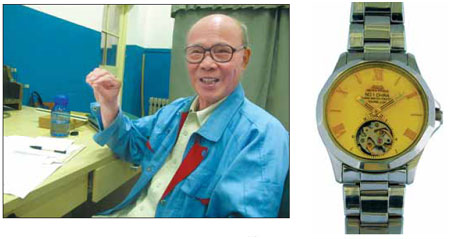The test of time
- By Wang Kaihao
 0 Comment(s)
0 Comment(s) Print
Print E-mail China Daily, August 9, 2012
E-mail China Daily, August 9, 2012
|
|
|
Above: Watch movement designer Xu Yaonan is one of nine national "master watchmakers". Wang Kaihao / China Daily Right: The first tourbillon made by Xu Yaonan. |
In the 1990s, when the Chinese market opened up to numerous Swiss luxury brands, the movement designer Xu knew Chinese watches need to be updated.
He attended the Hong Kong-based watchmaker Kiu Tai-Yu's exhibition in 1994 and saw a tourbillon, which it was claimed, was the first made in China.
Tourbillon is a watch element that originally aimed to counter the effects of gravity for more accurate timing, but has now become a symbol for top-tier watches due to the highly demanding construction process. A tourbillon weighs no more than a swan feather but contains 72 parts.
"I thought, he is just a watchmaker like myself. Why don't I try?" he says.
For the first time, Xu decided to design his own tourbillon, but didn't have any books or models to reference.
"It's like drawing on a blank sheet of paper. I knew the theory of how a tourbillon worked, but that was all. "
He had a look at old pocket watches to get inspiration but it didn't work.
Xu then took one year to make a tourbillon, generally considered to be the first made in the Chinese mainland. However, this achievement did not attract heavy attention after its birth.
"Many people asked me why I went to so much bother to make a tourbillon," Xu says. "They think no matter how it helps make timing more accurate, it cannot beat quartz watches. They don't realize watches are no longer only for timing."
Xu made three tourbillon and waited eight years until Miao and other managers decided to enter the high-end market.
Xu led a team for 11 months to make the watch "Playing Dragon and Phoenix", which sold for as much as 1 million yuan ($157,000) shortly after Baselworld, the world's leading watch and jewelry show, in 2006.
Nevertheless, Miao confesses the high-end watch brand is unable to rival their Swiss counterparts. But he adds the Beijing watch has its own characteristics.
The factory began to make watches using enamel dial plates in 2006, which was then uncommon among domestic watchmakers and is still a major selling point of their product today.
"We don't have to be homogeneous with others," Miao says, while staring at the watch he wears, made in the factory.
The factory produces 80,000 mechanical watch movements every year, but only about 2,000 high-end watches with tourbillon.
"The luxury watches are meat, and the ordinary ones are rice. It's not healthy eating just meat without rice. We have to build a solid base," Miao says.
According to CHA statistics, 65 percent of watch turnover in the Chinese market comprises Swiss watches. Zhang Hongguang thus expects more support from domestic consumers.
"If we only pursue foreign luxury brands, our own watches will have no space," Zhang says, adding it's urgent to encourage a new generation of watchmakers.
Xu's major at Tianjin University, which has nurtured many of the country's watchmakers, was cancelled in the early 1990s. Newcomers to the factory can only learn skills as apprentices.
And the relatively low pay is not attractive. Some experienced craftspeople at the factory can earn 6,000 yuan ($942) a month, while most ordinary workers get just 2,000 yuan.
"Xu and several other old masters are like our spiritual leaders," Miao says. "But I really worry there are no youngsters who are able to take on their work."
Zhang Hongguang adds he is not sure whether they can select nine watchmakers who are qualified to be called "masters" next year. "They are artists rather than artisans," he says. "We have to rebuild a systematic training program, though maybe only one among 100 people has the talent to be an artist."






